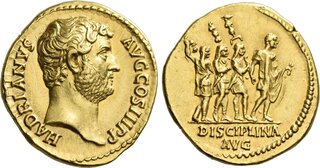| Numismatica Ars Classica > Auction 146 | Auction date: 8 May 2024 |
| Lot number: 2339 Price realized: This lot is for sale in an upcoming auction - Bid on this lot  | Show similar lots on CoinArchives Find similar lots in upcoming auctions on |
| Lot description: Hadrian augustus, 117 – 138. Aureus 134-138, AV 20 mm, 7.28 g. HADRIANVS – AVG COS III P P Bare head r. Rev. Hadrian advancing r., followed by three soldiers carrying standards; in exergue, DISCIPLINA AVG. C 540. BMC 602. RIC 1587. Calicó 1251 (these dies). Very rare and in exceptional condition for this difficult and intriguing issue. A wonderful portrait struck in high relief and a finely detailed reverse type. Minor marks, otherwise virtually as struck and almost Fdc Ex NAC 78, 2014, 954 and NAC 117, 2019, 281 sales. From the collection of a Retired Banker. This remarkable aureus of Hadrian, which celebrates 'the discipline of the emperor,' reveals an often underappreciated side of this emperor's personality – a strong belief in disciplina militaris. Dio Cassius (68.9) and the author(s) of the Historia Augusta (Hadrian 10.2-11.1) both comment on Hadrian's belief that the army should be run strictly, frugally, and efficiently. The latter gives the impression that Hadrian was a stickler for details, and that he often scrutinised military documents. They further note that he led by example, sharing in the privations of the common soldier by eating the same food, by living simply when in their presence, and often by marching twenty miles per day in full armour to provide a good example. The Historia Augusta suggests he did this to imitate the behaviour of, among others, his adoptive father Trajan. Hadrian insisted that even when soldiers were not on actual service they participated in rigorous training drills, which he sometimes led personally. This paints a picture quite unlike the usual view of Hadrian as a thoroughly indulgent emperor who was distracted by the arts, toured his empire in high style, was infatuated with many aspects of Greek culture, and who spared no expense in the construction of his palatial villa in Rome. The concept of discipline was well-suited to the lifestyle of Roman soldiers, who sometimes worshipped the minor divinity Disciplina. The archaeological record shows that Hadrian strongly promoted her virtues (which included frugality, sternness, and faithfulness) among the legions in Britain and North Africa. Her cult must have been well-established among the soldiers stationed along Hadrian's Wall, for the cavalry fort of Cilumum at the River Tyne was dedicated to the goddess. Hadrian's successor, Antoninus Pius, also was attentive to these ideals, and he issued sestertii (RIC 604 and 769) which replicate this original composition of Hadrian. Estimate: 50000 CHF |  |



